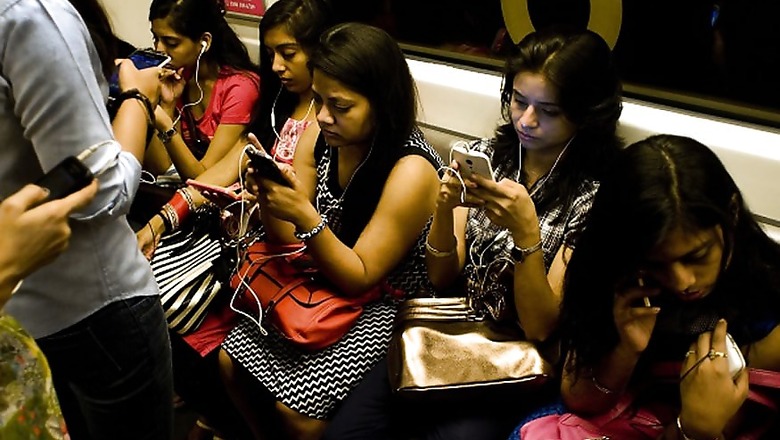
views
Recent reports that Tata Teleservices is headed for closure has once again underlined the tremendous stress India's telecom sector is under -- and the need for quick government intervention to bail out what was once a booming business. The fate of Tata Tele, which is reeling under a debt of over Rs 34,000 crore and may shut shop as early as this month, is symptomatic of what the sector is facing because of unsustainable spectrum prices and crippling price wars that have resulted in plunging profitability and high debt. According to industry sources, telecom companies together carry a debt of approximately Rs 5 lakh crore. However, the total sectoral liability -- if one takes into account loans from domestic banks, overseas borrowings and annual spectrum instalments -- is pegged at nearly Rs 8 lakh crore.
Tata Tele, with about 45 million users or about four percent of the market share, has seen its net worth fall by over Rs 11,600 crore in FY17, and losses increase from Rs 2,409 crore to Rs 4,617 crore year-on-year. Revenues, meanwhile were down 10 percent to under Rs 10,000 crore. With its proposed merger being called off due to regulatory and legal hurdles, Aircel will find itself hard put to pay off its debts. RCom, meanwhile, has in its communications spoken of a revised plan to pay off its debt by the sale of its tower business, the sale of fibre, monetising its real estate and spectrum trading.
The stress in the sector is such that most foreign players -- who once flocked to the Indian market sensing a huge opportunity -- are now fleeing the country. Telenor has been taken over by Bharti Airtel, Systema exited in favour of RCom, Tata still has to pay Docomo for their parting of ways and now with the RCom merger off, Aircel may have no option but to pack up. The only foreign player left is Vodafone, which is itself in the process of merging with Idea. How did a once-upbeat sector -- the second biggest and fastest growing after China -- come to such a pass?
One of the reasons is the high levies imposed on the sector. Industry bodies have often in the past bemoaned the fact that the Indian levy on the sector is in the 30 percent-plus range.
Compare this with China, where it is in the 11-12 percent range, or even other South Asian countries such as Pakistan, Bangladesh and Sri Lanka, where they are in the early 20s. Successive spectrum auctions over the past seven years -- aimed at increasing government revenue -- have also contributed significantly to the sector's woes. The price of spectrum in India is among the highest in the world and telecom firms have no option but to participate in the auctions and buy this expensive "raw material" if they want to stay relevant and competitive in the business.
The companies are, however, finding it extremely difficult to recover the crores of rupees spent in the auctions at a time tariffs have plunged. In India, average revenue per user (ARPU) is a measly $2 a month -- perhaps the lowest in the world.
Revenues from data services were supposed to flow in with the spectrum in place. But that has not materialised either. Global rating agency Fitch had earlier noted that monthly data consumption levels in Asian markets such as China, Hong Kong, Korea and Japan were nearly three to five times higher than in India. The entry of Jio last September has added to the troubles of existing players as their primary revenue earner -- voice, accounting for over 80 percent of revenues -- was suddenly being given away free. Companies like RCom, Bharti Airtel, Vodafone and Idea have been compelled to match Jio's offers to maintain market share -- to the detriment of their bottom lines.
According to figures put out by CLSA, a brokerage, and quoted by media, India's mobile industry revenue fell for the first time in FY17 to Rs 1.88 lakh crore and will decline further to Rs 1.84 lakh crore in FY18. The industry is seeking to counter these setbacks by consolidating. Vodafone India and Idea are likely to complete their merger by March next year. While Bharti Airtel has acquired Telenor's business, the RCom-Aircel deal has suffered a setback. Industry insiders say it is the time the government stepped in to help out the stressed telecom sector -- even adopting "drastic" steps like cutting spectrum usage charge, revenue share and abolishing the Universal Services Obligation Fund.
A Fitch official was quoted as saying in news reports that banks should treat spectrum funding as project financing and extend longer-tenure loans of 10 to 20 years. Whatever solution the government decides on, industry insiders believe, must be executed quickly -- else the telecom sector will suffer irreparable damage.
Watch Video: Xiaomi MI Mix 2 | Review | A Fascinating Smartphone Experience | News18 Tech












Comments
0 comment